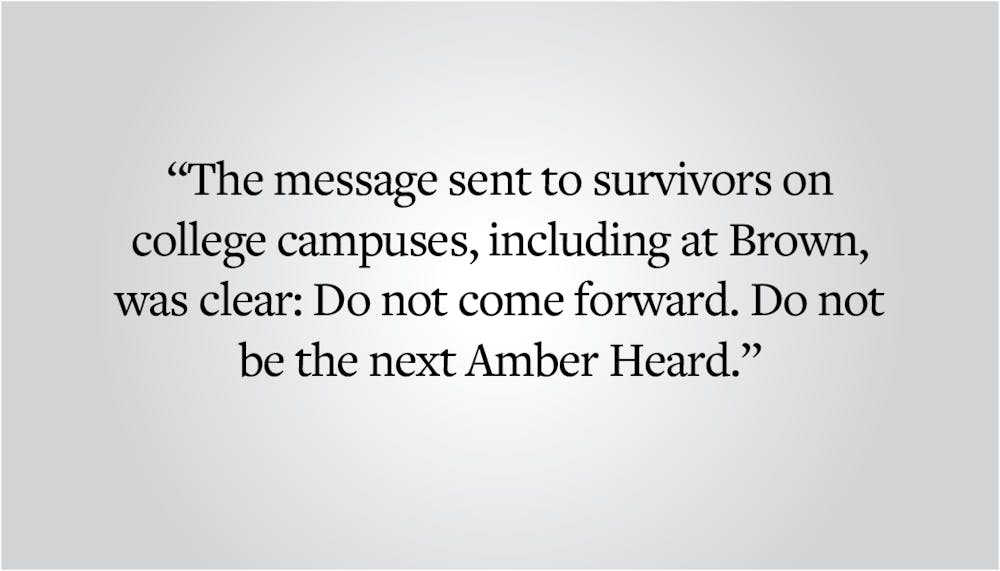TikTok is the defining app of our generation and a much more accessible source of information than traditional media outlets. So it is no shock that the app is becoming a major search engine for Gen Z. When the story of the Amber Heard and Johnny Depp trial — or perhaps more precisely, the story of Heard as a villain, abuser and liar — dominated TikTok for months in 2022, it certainly reached a number of young viewers, often quicker than traditional reporting on the subject did. The trial, originally a case that Depp filed against Heard for defamation, became a proxy for a more fundamental question: whether the jury believed Heard or Depp’s narrative of domestic abuse. The treatment of the trial on a platform aimed at young people proved something horrifying about our post-#MeToo world: Even among a younger, and supposedly more enlightened, generation we still have not created an environment where women can speak out about sexual violence.
If you were not on TikTok in spring 2022, let me catch you up on what happened. You could not go a minute without seeing a video designed to either attack or ridicule Heard — painting her as extremely unlikeable. Some videos contained viral accusations and jokes about her doing cocaine on the stand because she was so bold as to blow her nose. Others depicted parodies of her testimony. Either way, there was an endless supply of content dogpiling on an alleged abuse victim (the compilations of which are still racking up millions of views) — and it is undeniable whom many users on TikTok were siding with.
Of course, the reality of the case was not as simple as much of the internet’s conviction that Heard was in the wrong and deserving of this online harassment. Depp lost a near-identical case in the U.K., where the judge ruled that there was sufficient proof he was abusive to Heard and had made her fear for her life. He also used a common tactic of guilty abusers, DARVO (meaning deny attack and reverse victim and offender), in his strategy to win the U.S. case. This is something that legal experts are likely aware of and usually wouldn’t fall for — explaining why Depp lost his judge-only trial in the UK — but which the average person on a jury is much more likely to buy into. These facts alone should have prompted the average person to consider the possibility that the dominant narrative about Heard was wrong. But none of these facts seemed to mean anything in the face of an overwhelming wave of online hatred against Heard.
I remember seeing this occur in real-time and being confused as to why my generation, which was supposed to be more aware, more feminist and more sensitive to the plight of female abuse survivors in the wake of #MeToo, was participating in this public shaming of Heard so eagerly. I remember talking to female survivors I knew who were not only confused but deeply upset and terrified by the collective shaming of a fellow survivor just for talking about what she had been through. It seems this reaction was shared by many other survivors.
What does this mean for college students — at Brown and beyond? Last semester, the Title IX and Gender Equity Office released statistics showing that sexual misconduct reports had increased by 52% between the 2020-21 and 2021-22 academic years, from 87 to 132. While this increase was likely due to the return to campus post-COVID, it also could be attributed to policy changes that made reporting easier. This increase in reports is, in fact, a potential positive, considering just how many cases go unreported on every college campus. The Rape, Abuse & Incest National Network reports that 13% of all undergraduate and graduate students experience sexual assault, which, if that nationwide percentage held true at Brown, would mean an annual number an order of magnitude higher than the 132 reports the University saw last year. RAINN also reports that only 20% of female survivors report incidents to law enforcement. A 2002 study found that the majority of undetected college rapists are “serial perpetrators,” making it that much more dangerous if they are not reported.
And surely the mass ridicule of a high-profile survivor does not encourage the majority of survivors on college campuses who do not report these incidents to come forward. Perhaps some saw the case as a special instance where a younger, less famous and less powerful woman was the abuser instead of the victim. Perhaps some saw it as overreported celebrity drama that spawned a few funny jokes. It does not matter. The message sent to survivors on college campuses, including at Brown, was clear: Do not come forward. Do not be the next Amber Heard. Our collective attacks on this seemingly faraway woman contribute to a culture of silencing our peers who we are supposed to support and create a safe space for. It is more important than ever that we all ensure this culture does not continue.
We all owe Amber Heard an apology. It has nothing to do with whether you personally like her — it has very little to do with her at all. It has to do with the survivors here at Brown, and across the world, who now feel that they are that much less safe to speak up.
Paulie Malherbe ’26 can be reached at paul_malherbe@brown.edu. Please send responses to this opinion to letters@browndailyherald.com and other op-eds to opinions@browndailyherald.com





